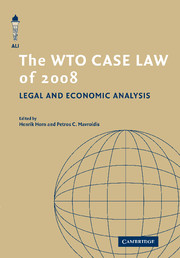Book contents
- Frontmatter
- Contents
- Foreword
- Introduction
- Appellate Body Report in EC–Bananas III: waiver-thin, or lock, stock, and metric ton?
- Guilt by association: US – Measures Relating to Shrimp from Thailand and US – Customs Bond Directive for Merchandise Subject to Anti-Dumping/Countervailing Duties
- Mexico–Olive Oil: Remedy without a cause?
- US–Stainless Steel (Mexico)
- Continued Suspense: EC–Hormones and WTO Disciplines on Discrimination and Domestic Regulation
- United States – Subsidies on Upland Cotton Recourse to Article 21.5 by Brazil
- China – Measures Affecting Imports of Automobile Parts
- India – Additional and Extra-Additional Duties on Imports from the United States
- Comment: India – Additional and Extra-Additional Duties on Imports from the United States
India – Additional and Extra-Additional Duties on Imports from the United States
Published online by Cambridge University Press: 07 September 2011
- Frontmatter
- Contents
- Foreword
- Introduction
- Appellate Body Report in EC–Bananas III: waiver-thin, or lock, stock, and metric ton?
- Guilt by association: US – Measures Relating to Shrimp from Thailand and US – Customs Bond Directive for Merchandise Subject to Anti-Dumping/Countervailing Duties
- Mexico–Olive Oil: Remedy without a cause?
- US–Stainless Steel (Mexico)
- Continued Suspense: EC–Hormones and WTO Disciplines on Discrimination and Domestic Regulation
- United States – Subsidies on Upland Cotton Recourse to Article 21.5 by Brazil
- China – Measures Affecting Imports of Automobile Parts
- India – Additional and Extra-Additional Duties on Imports from the United States
- Comment: India – Additional and Extra-Additional Duties on Imports from the United States
Summary
Abstract: This paper critically reviews the main findings of the Appellate Body in the case India – Additional and Extra-Additional Duties on Imports from the United States (India–Additional Import Duties). This ruling sheds light on the interplay between two core provisions of the GATT, namely Article II GATT (Schedules of Concessions) and III GATT (National Treatment on Internal Taxation and Regulation). Linked to this demarcation, the question on the allocation of the burden of proof was a central point of contention in this dispute. The ruling also establishes the principle that WTO Members are allowed to use border tax adjustments, as long as the tax imposed on imports does not exceed the domestic tax. We argue that this principle can help to reconcile the objectives of the WTO with those of national governments.
Introduction
This contribution critically reviews the main findings of the Appellate Body (AB) in the case India – Additional and Extra-Additional Duties on Imports from the United States (India–Additional Import Duties).
Next to the interpretations developed in the China–Auto Parts case dating from the same year (2008), these findings shed light on aspects of the interplay between two core provisions of the GATT, namely Article II GATT (Schedules of Concessions) and III GATT (National Treatment on Internal Taxation and Regulation). Remarkably, important questions on the delineation between these two ‘cornerstones’ of the GATT/WTO system were not only left open in the legal text, but also remained largely unexplored for more than 60 years in both the literature and GATT/WTO case law.
- Type
- Chapter
- Information
- The WTO Case Law of 2008 , pp. 239 - 264Publisher: Cambridge University PressPrint publication year: 2010

